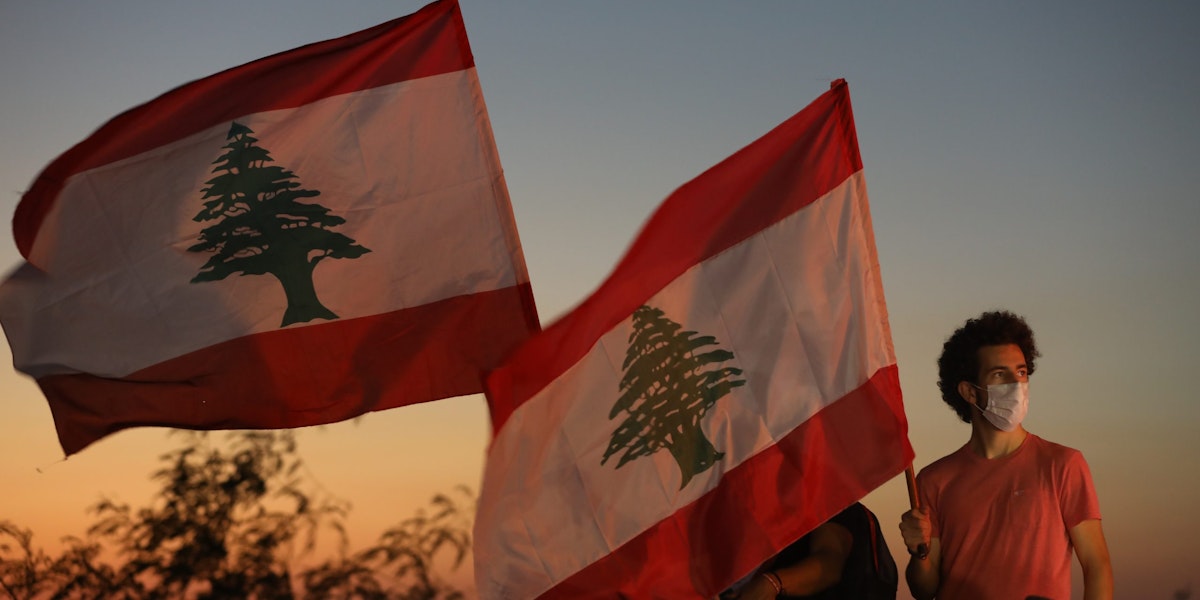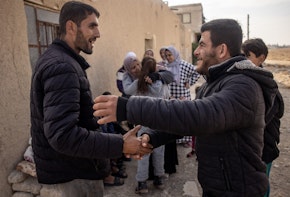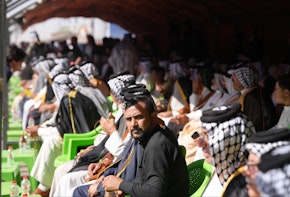In October 2019, hundreds of thousands of Lebanese took to the streets to demand political change. Many Lebanese felt optimistic that their country might finally free itself from its dysfunctional and corrupt sectarian system.
But nearly two years later—years that saw the COVID-19 pandemic, a devastating explosion at the Beirut port, and hyperinflation that has impoverished the Lebanese public—the country has become, in the words of many Lebanese, “hell.”1 The economy has collapsed. Ordinary people struggle to get scarce and unaffordable food, fuel, and medicine. Security is fraying.2 The promise of the “October 17 Revolution,” as protestors called it, can seem like a distant memory.
No one has an obviously good answer for how to arrest Lebanon’s downward trajectory. Lebanon’s establishment politicians are either incapable of or uninterested in undertaking the reforms necessary for economic rescue; yet those same politicians remain solidly in control of the country, having withstood the challenge of the mass protests of 2019.
How to save the country mostly comes down to a few key questions: Can Lebanon’s politicians be induced to do what’s necessary for the country, even at the expense of their parochial interests? Or, failing that, can Lebanese politics produce some new national leadership adequate to the country’s existential crisis?
The successor organizations of the October 17 protest movement are, like others, wrestling with these questions and thinking about how to achieve change in Lebanon. These political parties and activist groups have arrived at different answers; in fact, their contrasting theories of political change are among the main distinctions between them. Even groups with roughly consonant visions for Lebanon have embraced different strategies for how, in practice, to get there.
Ayman Zein al-Din, a member of the activist collective Shabab al-Masref (the Youth of the Bank), said that his group’s goal is getting from a Lebanese society that is divided and controllable by political-sectarian elites to a single Lebanese people under a civil state—an objective that is largely shared across Lebanon’s opposition groups, whatever means they have adopted. “This is the starting point, and that’s the destination,” said Zein al-Din. “The question is how we get there, from A to B.”3
The opposition groups featured in this report are not necessarily poised to assume power, or representative of the Lebanese public broadly. Even now, the country’s regime seems resilient. What’s more, the groups highlighted in this report do not represent the entirety of Lebanon’s opposition and activist movement, including groups active outside the capital, Beirut. Rather, the groups discussed here have been chosen to illustrate key strains of opposition thinking.
That thinking seems worth understanding because these groups are attempting to theorize political change in Lebanon, from Lebanon. Their ideas tell us about the groups themselves, but also about how they understand the Lebanese system. And their attempts at practice have a bearing on groups elsewhere that are challenging similarly resilient regimes—whether regimes that are unambiguously authoritarian or those, like Lebanon’s, that are procedurally democratic but, in practice, seemingly impervious to accountability, reform, and change.
A Collapsing Country
Lebanon’s opposition is contesting politics in a country that, for almost two years, has been imploding.
On October 17, 2019, Lebanon erupted in mass nationwide demonstrations against the country’s corrupt and inept political class. The protests shook the country’s political establishment; less than two weeks after they began, Prime Minister Saad Hariri resigned. They also catalyzed an incipient economic crisis, as a triangular confidence scheme—involving the country’s central bank, private bankers, and politicians—collapsed.4 The resulting crash—exacerbated by Lebanese elites’ unwillingness to cooperate with economic rescue initiatives—has been one of the most devastating in modern history.5
From early in Lebanon’s economic crisis, donor countries conditioned a bailout of Lebanon’s insolvent state and financial sector on extensive reform. When Hariri’s successor, Hassan Diab, tried to reach a preliminary agreement with the International Monetary Fund (IMF) in spring 2020, however, a coalition of politicians and powerful financial interests sabotaged negotiations.6 IMF talks have since been on hold.
Lebanese party politics have mostly reverted to familiar tropes: partisan attempts to gain relative advantage, political media gossip, and speculation about great-power intrigues.
Lebanese party politics have mostly reverted to familiar tropes: partisan attempts to gain relative advantage, political media gossip, and speculation about great-power intrigues and regional grand bargains. Diab resigned in August 2020 after the massive explosion at Beirut’s port; the country has had no empowered government since. Hariri was nominated again as prime minister, but stepped down after nine months of deadlock with President Michel Aoun over the composition of his government.7 Former prime minister Najib Miqati was nominated in Hariri’s place. On September 10, Miqati announced a new government, but one that seems beholden to the country’s political establishment and unlikely to seriously pursue reform and change. 8
Meanwhile, the wave of protest that swept Lebanon in 2019 has largely receded. Already by early 2020, mass protests had lost momentum. Demonstrations were marred by skirmishes with counterprotesters. Lebanese began to feel the economy’s contraction more acutely, and general fatigue set in. Hariri’s resignation had been an early victory for protesters, but Lebanon’s establishment forces unbalanced the opposition with Diab’s nomination in January to head an ostensibly technocratic government. The arrival of the COVID-19 pandemic in Lebanon in March 2020 further cleared the streets and pushed activist groups to transition to virtual organizing.9
The Beirut port blast on August 4, 2020 temporarily broke this torpor. The resulting destruction and loss of life stoked new popular anger, which built to a night of confrontational, deadly protest.10 But instead of inspiring new and sustained demonstrations, the initial outrage felt by many Lebanese quickly curdled into despair. Thousands emigrated.11 Since then, deteriorating economic conditions have prompted occasional bursts of angry demonstrations and protest actions, such as roadblocks, but nothing on the scale of the country’s 2019 mass movement.
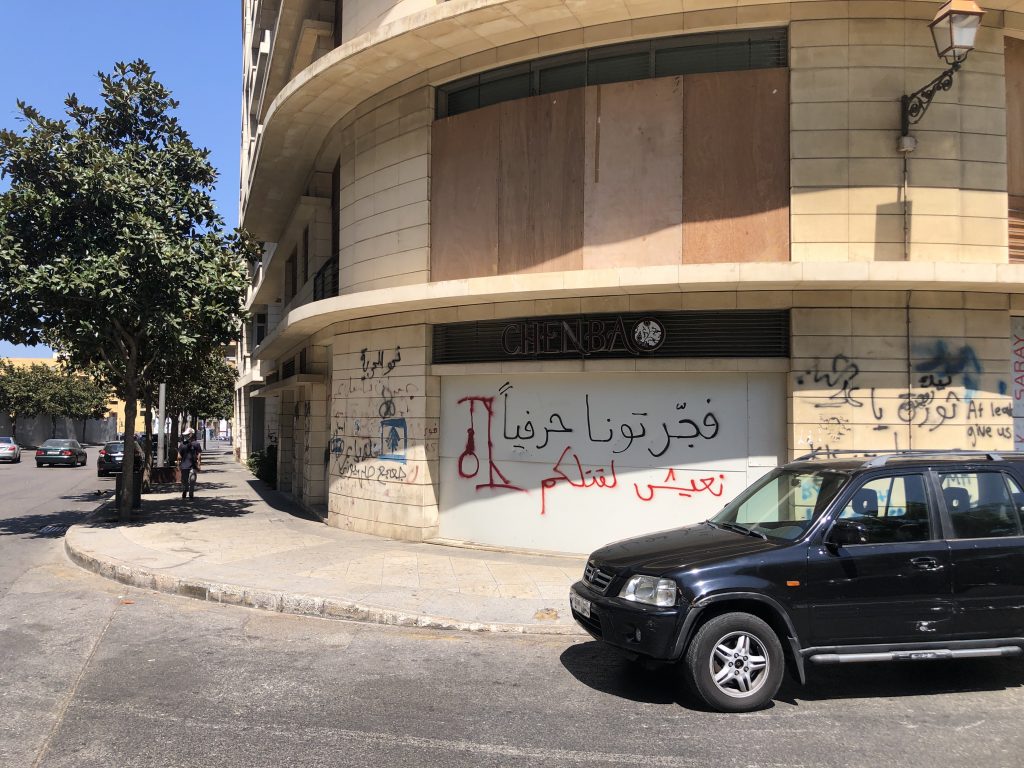
Many Lebanese are now busy just trying to survive. Since 2019, Lebanon’s currency has lost more than 90 percent of its value. More than half the population has fallen below the poverty line.12 For many in Lebanon, even the most basic necessities are beyond their means.13
New Ideas for Change
International donors have reiterated the necessity of reform to Lebanon’s political elites, but to little effect. Meeting donor demands such as audits of state finances and reform to the Lebanese energy sector would disrupt a sort of rentier equilibrium, in which Lebanon’s factions have divided the country’s spoils and used state resources to maintain their clientelist networks.14 And because of how Lebanon’s politics diffuse responsibility, there is no individual politician or party obviously to blame for obstructing progress on reform; each faction can, plausibly enough, blame another. The effect of politicians’ mutual finger-pointing is baffling and demobilizing. Lebanon’s politicians “all agree they don’t want reform,” said one diplomat from a donor country. “Because if they really implemented these reforms, it would be collective suicide.”15
Without reform, donors seem prepared to fund humanitarian aid and the Lebanese army, but not to contribute the type of support that could stabilize Lebanon’s economy. These countries have also taken to emphasizing that parliamentary and municipal elections currently scheduled for May 2022 must be held on time.16 (It should also be noted that, for years, these countries indulged their favored Lebanese factions and, for their own purposes, backed their Lebanese clients against domestic rivals.)
The October 17 protests’ principal slogan— “‘All of them’ means all of them”—doubled as its clearest insight into Lebanon’s collusive elite politics. The protest movement represented a break with the country’s past polarization between the March 8 Alliance and the March 14 Alliance. These rival coalitions were named after two mass mobilizations in spring 2005, when the assassination of former prime minister Rafik Hariri prompted calls inside Lebanon and internationally for the Syrian military to withdraw from Lebanon. On March 8, 2005, pro-Syrian crowds demonstrated in support of Syria’s role in Lebanon and its backing for Lebanon’s armed “resistance” to Israel. On March 14, opponents of Syria’s presence in Lebanon mounted a mass counterprotest demanding Syria’s exit. Syrian forces withdrew in April 2005, but the March 8 and March 14 camps would define Lebanon’s politics for years to come, as they staked out opposing positions on issues such as the independent armed status of Hezbollah (a political party and paramilitary force) and Lebanon’s relations with Syria.
The implicit premise of the October 17 movement, by contrast, was the idea that the country’s most important political cleavage was not the divide between March 14 and March 8, or between the sectarian communities atop which party elites situated themselves. Rather, it was the rift between the Lebanese public and the country’s “party cartel.”17
“October 17 showed a third way, to go beyond those vertical, fictional divides between March 14 and March 8,” said Naji Abou Khalil, an executive member of the National Bloc, an opposition party. Abou Khalil said he had previously been involved in March 14.18
Still, Lebanon’s establishment parties remain powerful and seemingly unwilling to depart the country’s political scene. These factions can play on their sectarian communities’ sense of insecurity and besiegement, and, in more material terms, they have built robust apparatuses of patronage and control that they have used to maintain their dominance.19 It is still unclear how those clientelist networks will be transformed by the country’s collapse. The bankruptcy of the Lebanese system may weaken these parties by denying them spoils to distribute, including state contracts and comfortable public sector employment. But some fear that deprivation will only reinforce the country’s clientelist order, by increasing an impoverished public’s dependence on parties that are able to draw on their elite members’ private wealth and on diaspora networks.20
Learn More About Century International
Lebanon’s Opposition Forces
Even a much-reduced October 17 movement still represents a political force.
The October 17 movement was unprecedented in its nationwide scope. It produced politically activated, networked citizens across the country, including Lebanese previously disengaged from politics and activists outside the capital, Beirut. The protests were also leaderless, a rejection of all Lebanon’s political incumbents. The movement’s antipathy to establishment politics could be a double-edged sword, however—it sometimes translated to suspicion of political organization, of any kind.
For most of the parties and activist groups that now identify with October 17, the movement was their defining political experience. Some groups emerged from that 2019 mobilization. These include Minteshreen (an Arabic pun meaning either “spread out” or “from October”) and Taqaddom (Progress), although these new groups’ members also include veteran activists. Other groups predated the movement but enthusiastically participated, seizing the opportunity to popularize their programs. This category includes the Popular Observatory for Anti-Corruption, Citizens in a State, and LiHaqqi (For My Right). All these “October 17” groups have had to figure out how to define themselves relative to a movement that was powerful, but also iconoclastic and inchoate.
Opposition parties and groups have so far coalesced into a few main coalitions. On April 13, groups roughly in Lebanon’s political center, including the National Bloc, Beirut Madinati (Beirut My City), and the Popular Observatory for Anti-Corruption, joined to both demand an immediate transitional government and appeal for a unified opposition list in next year’s elections.21 This coalition has branded itself Nida 13 Nisan (the April 13 Call). Other groups, such as Taqaddom and Khat Ahmar (Red Line) have formed the self-styled Lebanese Opposition Front alongside the Kataeb Party, the Christian establishment party that in recent years has repositioned itself as opposition.22 More long-standing leftist parties like the Lebanese Communist Party and the Popular Nasserist Organization, led by Ousama Saad, represent another opposition trend.23
These groupings are distinguished in part by how they balance the specificity of their policy positions with inclusive coalition-building and the exigencies of Lebanon’s current political moment. The challenge, according to the National Bloc’s Abou Khalil, has been how to be sufficiently broad-based to constitute a political force while also retaining some minimum coherence. “That balance is hard to find—where to establish the bounds of the ‘opposition,’” he said.24
“If you want to build a state without reckoning with Hezbollah—I’m sorry, that doesn’t work,” Haytayan said.
One key dividing issue is Hezbollah’s arms.25 The members of the April 13 Call have apparently parsed their position on Lebanese “sovereignty” and the state’s responsibility for national defense so as not to unduly alienate Lebanese sympathetic to Hezbollah’s “resistance.” But the Lebanese Opposition Front’s members are more full-throated in their opposition to Hezbollah.26 Taqaddom general coordinator Laury Haytayan told me the issue is important enough that parties need to take a clear, unequivocal position: “If you want to be relaxed on that and build a state without reckoning with Hezbollah—I’m sorry, that doesn’t work.”27
Opposition groups have also had to decide which other parties they are willing to tie up with, including some defectors from the country’s political establishment. One subject of controversy has been the Kataeb, the original standard-bearer of Lebanon’s Christian Right. Kataeb officials insist the party’s collective transformation is as real and laudable as the choice of any individual member of the opposition to break with establishment party politics.28 The Kataeb can also likely contribute resources and electoral infrastructure to any coalition. Still, some in the opposition argue that—in addition to their objections to the Kataeb’s political positions—allying with a historically sectarian party like the Kataeb necessarily means alienating much of the country.29
Still, opposition groups across these coalitions continue to meet and seem likely to deconflict their electoral participation.30 What the movement needs now is a “coordinated” opposition, not necessarily a “unified” one, said lawyer and Popular Observatory for Anti-Corruption official George Azar. “We’re not North Korea,” he told me.31
Key Dates and Political Movements
February 14, 2005
Former prime minister Rafik Hariri assassinated.
March 8, 2005
Mass mobilization in support of Syria and its backing for Lebanon’s “resistance” to Israel. Gives rise to the March 8 political coalition.
March 14, 2005
Mass counter-mobilization opposing Syria’s presence in Lebanon. Gives rise to the March 14 political coalition.
April 2005
Syrian forces withdraw from Lebanon.
July 2006
War between Israel and Hezbollah.
2015
Mass “You Stink” protests against the Lebanese government’s mismanagement of the waste crisis.
2016
Beirut Madinati (Beirut My City) reformists contest Beirut municipal elections.
2018
Opposition groups contest parliamentary elections as part of joint list, but secure only one parliamentary seat.
October 17, 2019
Mass protests against Lebanon’s corrupt political order erupt, beginning an opposition movement its partisans call “the October 17 Revolution.”
August 4, 2020
Beirut port blast shatters much of the city, killing more than two hundred.
April 13, 2021
On the anniversary of the start of the Lebanese Civil War (1975–90), groups roughly in the country’s political center join to form the April 13 Call.
May 2022
Planned parliamentary and municipal elections in Lebanon.
Opposition Theories of Change, and the Question of Timing
Among the most salient differences between these opposition groups are strategic ones—not just what they want to achieve, politically, but how they actually envision doing it.
The principal dilemma facing these groups is, to a large extent, one of timing. Lebanon and its political order are in flux; conditions in the country are seemingly worsening from one day to the next. At what moment in time, then, should these groups aim their political interventions? It is too late to avert Lebanon’s “collapse,” which is already underway. Things can always get worse, though. So should these groups work urgently to prevent some fuller catastrophe, now? Should they time their efforts according to Lebanon’s political calendar and key upcoming milestones, such as the 2022 national elections? Or should they operate on an even longer time horizon? When do these groups see a real opportunity to shift the country’s downward trajectory, and, based on that, how should they orient their approach?
It seems obvious that Lebanon is changing, inexorably. Changing into what, though, is less clear. Mohammad Faour, an economist and a member of Citizens in a State, described the current moment as a “de facto transitional phase.”
“We can’t change that reality, that we’re in that transitional phase,” he said. “But we can change the direction that transitional phase is heading. Now, where is it heading? It could head toward something better, or something worse. Right now, it’s heading toward something way worse. Can we turn that corner, away from that outcome?”32
Lebanese opposition groups’ theories of change tend toward one of three main approaches, each reflecting a different sense of timing:
- immediate, extraordinary action, typified by a demand for a transitional government to manage the country’s present crisis;
- electoral contestation, with a focus on next year’s parliamentary and municipal elections; and
- more ground-level efforts to produce societal change with eventual political effect, including both grassroots organizing and symbolic protest activism.
These three inclinations are not exclusive. Even opposition groups with mixed approaches, however, seem to emphasize some means over others—an apparent reflection of what those groups believe is necessary, and what is possible.
Extraordinary Measures
Among Lebanon’s opposition groups, one school of thought prioritizes immediate action to address the country’s worsening social and economic crisis.
Citizens in a State is probably the opposition’s most prominent and insistent proponent of urgent change. The party is led by former labor minister, economist, and political gadfly Charbel Nahhas. Since its inception in 2016, Citizens in a State has advocated a structural reordering of the Lebanese system. (Memorably, Nahhas previously dismissed the good-governance platform of groups like Beirut Madinati as “municipal bullshit.”33) The party is known for having an especially developed political-economic program.34
Citizens in a State wants to address Lebanon’s crisis now, not after the years it would take to build a political apparatus capable of competing with the country’s establishment parties.35 To that end, Citizens in a State has advocated a sort of elite pact negotiated with the handful of political leaders who, together, hold effective power in the country and could muster sufficient parliamentary votes to seat a transitional government with exceptional legislative powers.36 Citizens in a State has posited that after sufficiently shifting the country’s political balance against these leading figures—including by making its case to the public and building mass support—the party would push them to peacefully cede power to this transitional government. The party’s argument to these political leaders is an interests-based one: Lebanon’s postwar regime has reached its end, and its political leaders are incapable of managing the resulting crisis. Now, if they hope to preserve their own communal status and spare their constituents suffering, or even war, they have no choice but to negotiate a handover of power to an emergency government that can manage Lebanon’s economic crisis and lay the foundations of a future civil state.37
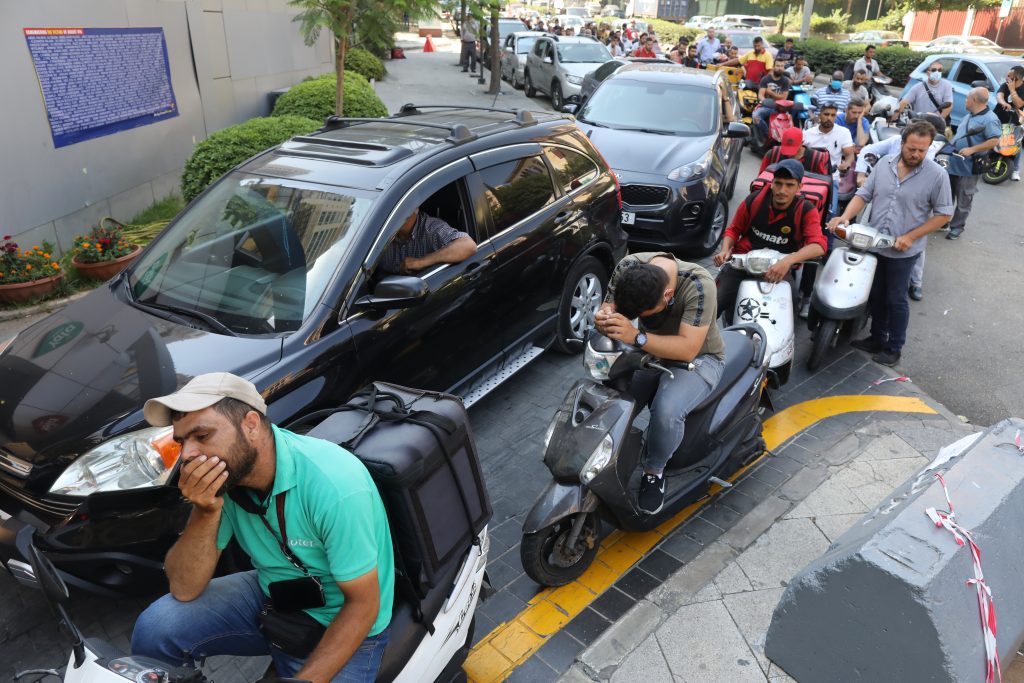
Citizens in a State’s theory of change reflects an apparent conviction that the stakes of Lebanon’s crisis are so high that there can be no realistic alternative to immediate action. In this view, more gradualist options such as contesting upcoming elections are basically beside the point. These other means will not produce necessary systemic change, and, as Lebanon’s crisis demolishes the country, there will eventually be little left to contest.
In one view, gradualist options—such as elections—will not produce systemic change. And as Lebanon’s crisis wrecks the country, there will eventually be little left to contest.
Other opposition groups, however, dispute that Citizens in a State’s negotiated transition is any more “realistic” than other approaches. Azar, of the Popular Observatory for Anti-Corruption, dismissed the idea that Lebanon’s elites would agree to give up power, even if it meant war: “They won’t cave.”38
Even if an immediate solution to Lebanon’s crisis is implausible, however, that is little consolation for ordinary Lebanese, for whom life grows more crushing and intolerable every day. They can hardly afford to wait for political incrementalism. Groups that focus on more medium- and long-term solutions risk looking like they fail to appreciate the urgency of the country’s current moment.
This is seemingly why the April 13 Call, for example, incorporated a demand for a transitional authority into its introductory appeal, even if its members seem to be concentrating their efforts on elections. Many of the same groups also called for a transitional government, among other measures, after the August 2020 Beirut port blast.39 “You have to address the suffering of people, and show you care,” said the National Bloc’s Abou Khalil. “That’s why we need a transitional government—it’s the only realistic response.”40
Electoral Contestation
Lebanese groups that have opted to focus on next year’s parliamentary and municipal elections have identified the vote as an opportunity to secure representation and institutional power, as well as to demonstrate that they have a real popular constituency.
Abou Khalil said the April 13 Call coalition to which his party belongs is now working to recruit and train electoral candidates, and to arrange campaign financing. The coalition’s member groups from outside Beirut also represent a “reservoir of good, locally credible candidates,” he said. “I think a lot of people would vote for the opposition, if they were given a clear choice.”41
Opposition parties cannot simply assert that they are a political alternative, said Azar, of the Popular Observatory: “You have to show the alternative.”42 Azar stressed the importance of threatening establishment parties’ support within their respective sectarian communities, saying that elections are key. “That’s what scares them most, and what will let them start to make concessions,” he said.43
No one expects that opposition parties will win a majority of parliament’s 128 seats. Yet Haytayan, the Taqaddom general coordinator, argued that an opposition win of even fifteen or twenty seats could change the dynamic in the country’s legislature. It would mean “a real opposition [goes] into parliament—one that isn’t part of the same political system, and the same clan.”44 Kataeb official Marwan Abdallah said that even a minority bloc could be “changemakers,” by demonstrating an alternative and yielding even greater results in subsequent elections.45
Yet Haytayan also said that Taqaddom and other opposition groups’ current focus on elections was, to some degree, circumstantial. From the start of the crisis, she said, she had wanted a Lebanese government to urgently address the country’s economic crisis; instead, its ruling elites wasted almost two years. “It’s not that we thought that the way out of the crisis was elections,” she said. “We wanted that [immediate action] to happen… But we say that, in the face of this situation, the next milestone is elections. So we’ll work through the system, with the democratic tools we have in hand.”46
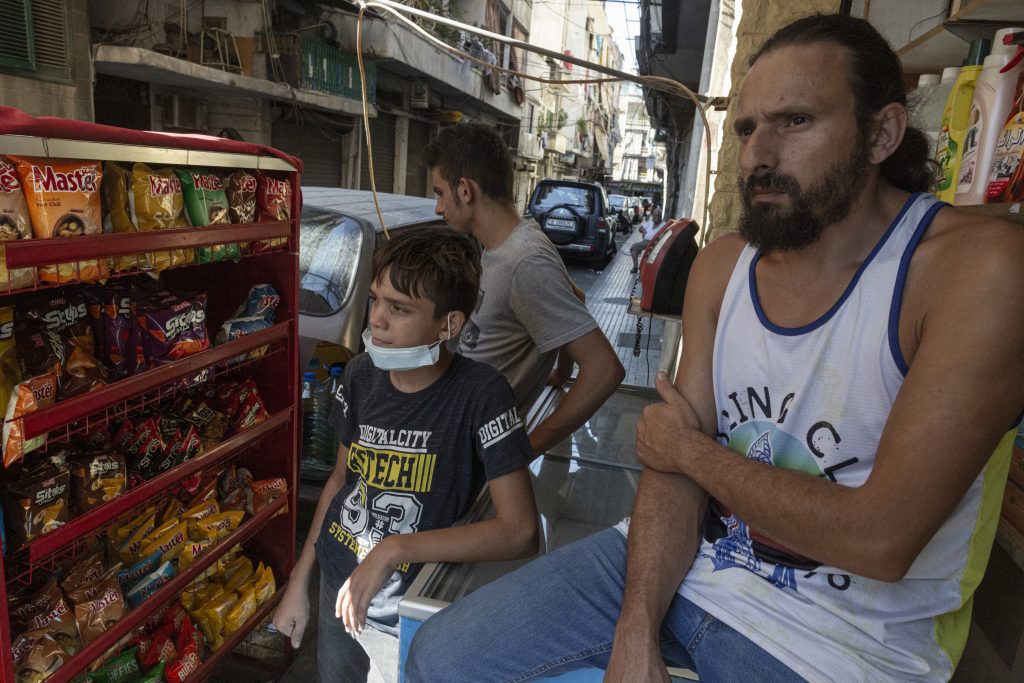
And if Lebanon’s emerging parties want to be taken seriously, she said, they have little choice but to wade into electoral politics: “You need to be proactive, you need to be involved and engaged. Life is dynamic. I cannot say, ‘I’m going to sit in a corner and build my party, and even as all these milestones are happening, I’m not going to engage until I’m ready’… With these dynamics that exist, you need to be engaged in them, if you consider yourself a political entity.”47
Even for groups that recognize the likely limitations of elections, participation will be an opportunity to organize and promote their respective platforms. Asked if his party would compete in elections, Lebanese Communist Party youth sector official Mohammad Bzeih expressed a view similar to Haytayan’s: “It’s one station of the struggle. We’ll fight in it.”48
If the opposition wins in next year’s elections, that may also help convince the countries now attempting to intercede in Lebanon’s crisis that opposition parties are genuinely necessary interlocutors. Despite foreign diplomats’ increasingly vocal frustration with Lebanon’s establishment politicians, those politicians remain the country’s elected leaders, and they hold the legislative and executive authorities necessary for the passage of any reforms.49 Opposition groups, meanwhile, have struggled to be considered real political actors—not just “civil society.”50 In the wake of the August 2020 port blast, French president Emmanuel Macron chose to meet with Lebanon’s establishment parties to secure their agreement on a road map for reform. By contrast, French foreign minister Jean-Yves Le Drian accorded opposition groups new recognition when he met with them this May: French diplomats assured invitees that the meeting was for “alternative political forces”—not “civil society.” Le Drian reportedly encouraged groups in attendance to unify in advance of the 2022 elections.51
Still, there are reasons to be skeptical about elections as an avenue for change. First, the country is already imploding; no one knows what it will look like next year. And there is no guarantee that Lebanese authorities will actually hold elections as planned—Lebanon’s 2018 parliamentary elections were originally scheduled for 2013, before the country’s political incumbents repeatedly postponed them. The Lebanese state responsible for administering elections is already coming apart at the seams.52
Opposition parties will likely also have to contest elections under the country’s 2017 electoral law, which, since its passage, has been criticized for advantaging sectarian incumbents.53 The 2018 elections yielded only a single parliamentary seat for the country’s unified opposition list.54 What’s more, the sort of irregularities that reportedly marred the 2018 elections may be even worse next year.55 “It will be ‘cheaper’ to buy people’s votes,” predicted Faour, of Citizens in a State.56 Even if voters are not bribed outright, their fraught circumstances may make them more reluctant to risk government funds and services for their community by voting for change.
Lastly, many Lebanese may simply prefer their respective establishment party. These parties likely still command considerable popular support.57 Zein al-Din, the Shabab al-Masref activist, said he thought there might be some shift in the electorate, but only within a limited margin. “Not to the degree that would allow you to overturn things and change the equation,” he said.58
Faour said Lebanon’s electoral math just does not add up for radical political change. “I’ll put it bluntly,” he said about elections. “I think it’s a farce.”59
Grassroots Activism
Some groups have chosen to work below the threshold of formal institutional politics to change Lebanon’s political culture broadly.
One such approach has been continued protest activism, now more targeted than the mass demonstrations of 2019. One of the groups at the forefront of these street protests has been Shabab al-Masref, an activist collective that originally emerged from demonstrations in front of Lebanon’s central bank in 2019.
Zein al-Din said that Shabab al-Masref’s continuing street protests and activism aim “to cultivate popular support in order to force the political class, not to ‘surrender,’ necessarily, but to account for the need for change.”60 The protests of October 2019 had directly involved the Lebanese public, he said, as people took to the streets en masse. Now, a smaller activist vanguard is working to “create a new condition” in the streets, “so that people can join this change and be a part of it.”61 Efforts like these to counter establishment narratives seem to complement the work of new alternative media outlets, such as Megaphone.62
“Most work today is educational,” Zein al-Din said, “urging people to revolt against this regime, and to reject it.” But, he added, “let’s be clear: the goal is not education. The goal is changing this regime.”63
Again, this more ground-level protest activism is not incompatible with other theories of change. Shabab al-Masref, for example, has endorsed Citizens in a State’s program for change.64 Saad, of the Popular Nasserist Organization, has said that activists need to “clash” with the Lebanese authorities if they are to have real credibility, and so the public actually has a reason to vote for them in next year’s elections.65 Popular Observatory figures like Wasef al-Harakeh continue to be at the forefront of demonstrations, and the organization also plays an auxiliary role in protests by fielding lawyers to secure the release of detained activists.66
The name of the latter group—the Popular Observatory for Anti-Corruption—itself reflects a desire to change the way the Lebanese public understands politics, Azar said. “We’re fighting corruption not only as a crime, but as a system, related to sect,” he said. “Of course it’s a crime. But it’s not just a matter of an employee stealing from the drawer in a municipality. We want to convince people that it’s in their interest to revolt against this regime, by relating corruption and their poor living conditions to this sectarian regime.”67
“We’re fighting corruption not only as a crime, but as a system, related to sect,” George Azar said.
Other groups have focused on grassroots organizing to enable citizens’ meaningful participation in Lebanon’s politics.
LiHaqqi is one group known for its focus on grassroots organizing by geography and by sector, in keeping with its own decentralized and participatory structure. “We believe the failure of the state is not just because of failed policies,” said LiHaqqi member Adham al-Hassanieh. “It’s because of structural failures, and the exclusion of people from the country’s real political scene.” Ordinary Lebanese talk politics, said Hassanieh, but actual decision-making is limited to a narrow elite, even inside political parties. The only solution, he said, is popular, bottom-up change.68
LiHaqqi originated as an electoral campaign in the Chouf-Aley area in 2017, and has since attempted to replicate its model elsewhere. (It has not yet announced whether it will participate in next year’s elections.) The group has worked from the assumption that a grassroots approach—in which area residents are engaged by locals, not by unfamiliar Beirut activists—is necessary for sustainable political change.69
LiHaqqi and others like the Lebanese Communist Party have also aimed to build power through labor unions, student unions, and various social movements.70 These efforts are part of building a “social force,” said Bzeih, of the Lebanese Communist Party. Establishment parties have people behind them, he said; the opposition needs to create something comparable.71
In June, Lebanese activists scored a victory when a list backed by a broad coalition of opposition forces defeated establishment candidates in elections for the country’s Engineers and Architects Syndicate, one of Lebanon’s largest professional syndicates.72
Of course, the obvious critique of these projects comes back to timing: Lebanon is disintegrating now. The country’s crisis could very well erase whatever grassroots gains these groups realize.
Even at the most extreme point of the crisis, though, activists may still be able to organize to useful effect, or to invest in alternative structures that outlast some of the country’s institutions. Hassanieh said LiHaqqi is trying to foster “local alternative solidarity groups,” including cooperatives to provide basic goods, support for agriculture, and some social safety net.73 Researcher and LiHaqqi member Nadim El Kak characterized the project as an effort to “develop community-oriented alternatives to clientelism.”74
These groups are not convinced they can halt Lebanon’s implosion, however. “I don’t think that’s our role here,” said Hassanieh. “We don’t believe that—at this stage, with what we have—we can intervene to stop this collapse.”75
“Realism” and Its Limits
Maybe none of these opposition groups’ theories of change are realistic. But what is “realistic,” really, when all Lebanon’s systems are breaking down?
“Ex ante, radical political change is always a low-probability outcome,” said Faour, of Citizens in a State. “But still, you take the chance.”76
Lebanon’s opposition groups are not alone in the region in their attempts at political change, nor are the challenges they face entirely unique. Iraq, in particular, resembles Lebanon in important structural respects, and Iraqi activists, like their Lebanese counterparts, are thinking through how to change a system that is dysfunctional but resilient. Iraqi activists have similarly debated whether it is worthwhile to participate in formal politics and to contest upcoming elections, currently planned for October 2021.77 Though there is little indication that the two countries’ activists are substantially interlinked or closely watching each other, Lebanese opposition groups’ performance may nonetheless offer lessons for how to achieve reform and change in Iraq, and vice versa.
Still, oil-rich Iraq does not face the kind of bankruptcy and collapse that has overtaken Lebanon. And indeed, things in Lebanon seem likely to get much worse, whatever opposition groups do. That may make these groups’ work impossible. Political organizing will be much harder if, for example, electricity and the Internet are less available.78 The country’s swift deterioration may mean that longer-term programs and plans are moot. “We’re living month to month. Not even that—more like every fifteen days,” said Shabab al-Masref activist Hussein al-Miqdad.79
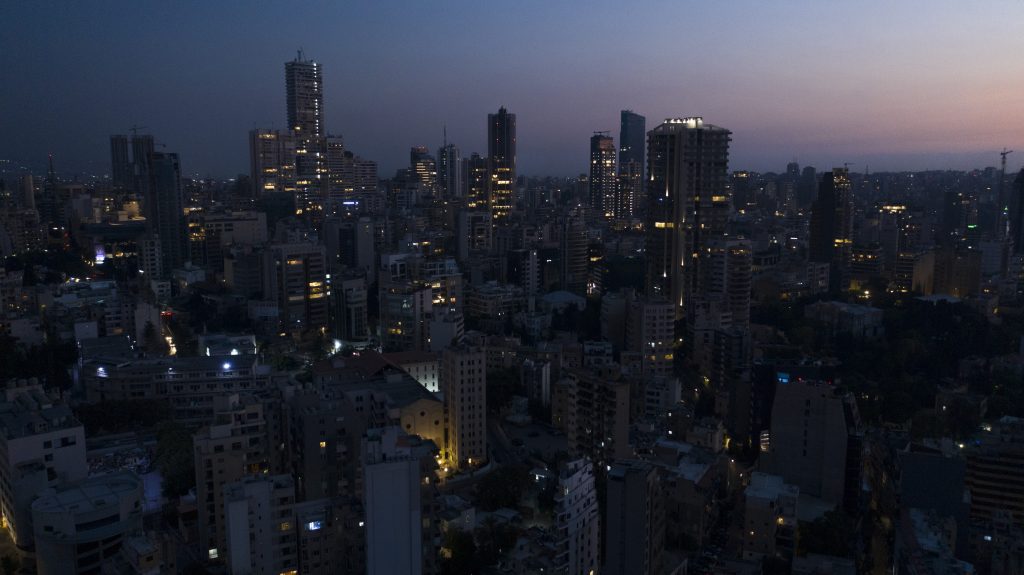
And as much as Lebanon’s opposition groups have endeavored to affect popular opinion, what seems most likely to shape mass politics in the country is people’s worsening material circumstances.80 If increasingly impossible living conditions generate some new surge of popular energy and anger, who knows how that might manifest—it might produce something less considered than these opposition groups, and more violent. Lebanon has already seen riots and skirmishes between demonstrators and security forces, in addition to more parochial violence over scarce resources.81
Lebanon’s establishment parties also have agency. They decide whether elections will be held next year, or whether their partisans will take up arms. Opposition groups’ strategies for change will necessarily come up against these incumbents’ counterstrategies.
As much as Lebanon’s opposition groups try to affect popular opinion, what seems most likely to shape mass politics in the country is people’s worsening material circumstances.
Opposition activists with whom I spoke said they were keen to avoid violence, reasoning that establishment parties—many of which originally emerged from Lebanon’s civil war—are best-adapted to conflict. “That violent playing field is their playing field,” said Shabab al-Masref’s Zein al-Din.82
“We’ve opposed any diversion to militant actions,” said Bzeih, of the Communist Party. “It risks bringing civil war, to no one’s benefit. . . . We don’t have [these establishment parties’] force, and their power—it’s their game.” The Communist Party was one of many militant factions that participated in the Lebanese Civil War (1975–90). But now, Bzeih said, the party saw no real alternative to peaceful, democratic means. “It’s not an ethical issue for us. It’s just not possible.”83
Whatever these opposition groups want and intend, however, conditions in Lebanon may yet become more extreme and violent. These groups’ continued relevance could then depend on how well they can adapt. To that end, these opposition groups’ ideas—their respective programs of reform, or theories of political change—may matter less than their organizational strength, and whether they can put their social and institutional resources toward some new and meaningful role in an increasingly inhospitable and dangerous context.
This further, chaotic collapse could well defeat activists’ aspirations and empower reactionary forces. Still, we cannot discount that it might do the opposite—open up possibilities for radical, transformative change that would have been unimaginable in less adverse circumstances.
One thing is certain: Lebanon’s status quo seems finished. As for what comes next, though, and if there is a way to make it something better—these are questions with which all Lebanese are now grappling. These October 17 groups have their own theories and tentative answers, based on their analysis of Lebanon’s politics and society. Now they’ll try to apply them, and to translate them into action and change.
This report is part of “Transnational Trends in Citizenship: Authoritarianism and the Emerging Global Culture of Resistance,” a TCF project supported by the Carnegie Corporation of New York and the Open Society Foundations.
header image: People wave Lebanese flags and chant on October 17, 2020 in Beirut to mark the one-year anniversary of the unprecedented mass anti-government protests in Lebanon. Source: Marwan Tahtah/Getty Images
Notes
- Tala Ramadan, “‘We Are Really in Hell’: With Fuel Price Hike Looming, Lebanon Descends Further into Chaos,” L’Orient Today, June 28, 2021, https://today.lorientlejour.com/article/amp/1266676/we-are-really-in-hell-with-fuel-price-hike-looming-lebanon-descends-further-into-chaos; “‘Hell on Earth’: Lebanon Unlivable as Crisis Deepens,” AFP, August 20, 2021, https://www.france24.com/en/live-news/20210820-hell-on-earth-lebanon-unlivable-as-crisis-deepens.
- Bassem Mroue, “Economic Crisis, Severe Shortages Make Lebanon ‘Unlivable,’” Associated Press, July 1, 2021, https://apnews.com/article/beirut-middle-east-lebanon-business-4dbb84e6f2b43e0e1e1f090b592c0c04; Ben Hubbard, “As Lebanon’s Crisis Deepens, Lines for Fuel Grow, and Food and Medicine Are Scarce,” New York Times, July 5, 2021, https://www.nytimes.com/2021/07/05/world/middleeast/lebanon-economic-crisis.html.
- Ayman Zein al-Din, Shabab al-Masref, interview with the author, Beirut, April 2021.
- Ben Hubbard and Liz Alderman, “As Lebanon Collapses, the Man With an Iron Grip on Its Finances Faces Questions,” New York Times, July 17, 2021, https://www.nytimes.com/2021/07/17/business/lebanon-riad-salameh.html. For an early warning about Lebanon’s economic house of cards, see Rosalie Berthier, “Abracadabra… Broke,” Synaps, May 2, 2017, https://www.synaps.network/post/lebanon-economy-crisis.
- “Lebanon Economic Monitor, Spring 2021: Lebanon Sinking (to the Top 3),” World Bank, May 31, 2021, https://www.worldbank.org/en/country/lebanon/publication/lebanon-economic-monitor-spring-2021-lebanon-sinking-to-the-top-3.
- Nada Maucourant Atallah and Omar Tamo, “Dangerous Liaisons: How Finance and Politics Are Inextricably Linked in Lebanon,” Le Commerce du Levant, January 15, 2021, part one, https://today.lorientlejour.com/article/1248323/dangerous-liaisons-how-finance-and-politics-are-inextricably-linked-in-lebanon-part-i-of-ii.html; and part two, https://today.lorientlejour.com/article/1248324/dangerous-liaisons-how-the-system-got-the-better-of-the-technocrats-part-ii-of-ii.html.
- Ben Hubbard, “Lebanon’s Designated Prime Minister Quits amid Swirling Crises,” New York Times, July 15, 2021, https://www.nytimes.com/2021/07/15/world/middleeast/lebanon-prime-minister-saad-hariri.html.
- . “The main challenges facing Lebanon’s new government,” AFP, September 12, 2021, https://www.france24.com/en/live-news/20210912-the-main-challenges-facing-lebanon-s-new-government.
- Kareem Chehayeb, “Lebanon’s Emerging Opposition: From Covid-19 to the 2022 Elections,” Lebanese Center for Policy Studies, June 17, 2021, https://www.lcps-lebanon.org/agendaArticle.php?id=213.
- Ben Hubbard and Mona El-Naggar, “Clashes Erupt in Beirut at Blast Protest as Lebanon’s Anger Boils Over,” New York Times, August 8, 2020, https://www.nytimes.com/2020/08/08/world/middleeast/Beirut-explosion-protests-lebanon.html.
- Zeina Karam, “Driven by Despair, Lebanese Pharmacist Looks to Life Abroad,” Associated Press, May 13, 2021, https://apnews.com/article/beirut-europe-middle-east-lebanon-immigration-c24d8997337510786121eac87eec1bd6.
- “Around 1.5 Million Lebanese in Need, Top Un Humanitarian Official There Warns,” UN News, June 14, 2021, https://reliefweb.int/report/lebanon/around-15-million-lebanese-need-top-un-humanitarian-official-there-warns.
- For example, see “Lebanon Families Spend ‘5 Times Minimum Wage’ on Food: Study,” AFP, July 21, 2021, https://www.rfi.fr/en/middle-east/20210721-lebanon-families-spend-5-times-minimum-wage-on-food-study.
- Key measures that donors have sought include a capital controls law; the unification of Lebanon’s multiple official exchange rates; comprehensive audits of Lebanese state institutions, including its Central Bank; reforms to loss-making state-controlled entities, particularly in Lebanon’s energy sector; and an expanded social safety net for the country’s most vulnerable. For example, see “Reform, Recovery and Reconstruction Framework: Second Consultative Group Meeting: Co-Chairs’ Statement,” European Union/United Nations/World Bank, July 29, 2021, https://reliefweb.int/report/lebanon/lebanon-second-consultative-group-meeting-reform-recovery-and-reconstruction. For more detail, see “Lebanon Reform, Recovery & Reconstruction Framework (3RF),” European Union/United Nations/World Bank, December 4, 2020, https://documents1.worldbank.org/curated/en/948021607068524180/pdf/Lebanon-Reform-Recovery-and-Reconstruction-Framework-3RF.pdf.
- Western donor country diplomat, interview with the author, Beirut, March 2021. “I think there’s a growing sense of frustration, among diplomats here in Beirut and in capitals, toward the political class as a whole,” the diplomat said. “It’s no longer a matter of, ‘Oh, he’s a bit better than the others.’ They all share responsibility for this situation.”
- For example, see “Joint Statement of the International Support Group for Lebanon on the Eve of 4 August,” UNSCOL, August 3, 2021, https://unscol.unmissions.org/joint-statement-international-support-group-lebanon-eve-4-august.
- Christiana Parreira, “Another Unity Government Won’t Solve Lebanon’s Crisis,” Washington Post, August 20, 2020, https://www.washingtonpost.com/politics/2020/08/20/another-unity-government-wont-solve-lebanons-crisis/.
- Naji Abou Khalil, National Bloc, interview with the author, Beirut, April 2021.
- For example, see Sima Ghaddar, “Machine Politics in Lebanon’s Alleyways,” The Century Foundation, May 6, 2016, https://tcf.org/content/report/machine-politics-lebanons-alleyways/.
- Some political forces have already taken steps to provide for their constituents’ minimum needs. For example, see Wael Taleb, “When Darkness Looms, Lebanon’s Political Parties Ride in with Light-Giving Fuel,” L’Orient Today, August 11, 2021, https://today.lorientlejour.com/article/1271287/when-darkness-looms-lebanons-political-parties-ride-in-with-light-giving-fuel.html.
- These groups chose to announce their coalition on the anniversary of the start of the Lebanese Civil War, in a symbolic rejection of Lebanon’s past civil conflict and subsequent warlord politics. For more on Beirut Madinati, see Thanassis Cambanis, “People Power and Its Limits,” The Century Foundation, March 29, 2017, https://tcf.org/content/report/people-power-limits/.
- For the Lebanese Opposition Front’s member groups, see Lebanese Kataeb Party (@LebaneseKataebParty), “Lebanese Kataeb Party,” Facebook post, April 16, 2021, https://www.facebook.com/LebaneseKataebParty/posts/3867511346663480. For one explication of the April 13 initiative, see Minteshreen head Hussein El Achi’s appearance on the Lebanese Politics Podcast: “Episode 106: The new opposition,” May 31, 2021, https://www.facebook.com/LebPoliticsPod/posts/849183149007569.
- A number of these groups announced the Liqa al-Taghyir (the Meeting for Change) coalition last year. “Launch of Liqa al-Taghyir—for a Democratic Lebanon” (in Arabic), Lebanese Communist Party, February 23, 2021, http://lcparty.org/lebanon/item/31599-2020-03-15-00-32-23. For another taxonomy of opposition groups, see Rula Ibrahim, “The Uprising’s Five Trenches: Online ‘Revolution’” (in Arabic), Al-Akhbar, April 22, 2021, https://al-akhbar.com/Politics/304578.
- Abou Khalil, interview.
- The issue led to bitter acrimony at an opposition conference last year. Rula Ibrahim, “‘National Salvation Conference’: The Sons of ‘the Revolution’ Eat It” (in Arabic), Al-Akhbar, October 27, 2020, https://al-akhbar.com/Politics/295689.
- For example, see the Lebanese Opposition Front’s condemnation of Hezbollah’s exchange of fire with Israel this August: Lebanese Opposition Front (@LebaneseOppositionFront), “Lebanese Opposition Front” (in Arabic), Facebook post, August 7, 2021, https://www.facebook.com/LebaneseOppositionFront/posts/193353376173827.
- Laury Haytayan, Taqaddom, interview with the author by phone, July 2021. Kataeb official Marwan Abdallah said his party and its coalition partners believe in the necessity of pursuing both reform and the restoration of Lebanon’s sovereignty in tandem, not prioritizing one over the other. Marwan Abdallah, the Kataeb, interview with the author by phone, July 2021.
- Abdallah, interview. In explaining her party’s partnership with the Kataeb, Taqaddom’s Laury Haytayan pointed to the Kataeb’s consistent opposition to the country’s dominant parties since 2016, culminating, in 2019, in its parliamentarians’ resignation. She also said that how opposition parties engaged the Kataeb might encourage other traditional parties to break with the establishment. “This is how you dismantle a regime,” she argued. Haytayan, interview.
- At the other end of Lebanon’s political spectrum, some groups have been unwilling to partner with the Lebanese Communist Party. The Communist Party is a longstanding feature of Lebanon’s independent political opposition, but one that fought in the country’s civil war and that some other groups now characterize as too friendly with Hezbollah.
- See, for example, the June meeting between National Bloc and Kataeb leaders. “Gemayyel Meets Delegation from National Bloc: Stressing Sovereign and Patriotic Principles” (in Arabic), the Kataeb, June 22, 2021, https://kataeb.org/sl/AR/328807.
- George Azar, Popular Observatory for Anti-Corruption, interview with the author, Beirut, April 2021.
- Mohammad Faour, Citizens in a State, interview with the author, Beirut, April 2021.
- Cambanis, “People Power and Its Limits.”
- “Our Vision,” Citizens in a State, https://mmfidawla.com/en/economic-political-vision/.
- “Obeida Takriti: Most Prominent Difference between Us and Others Is How to Deal with Time” (in Arabic), posted to YouTube by mmfidawla—Citizens in a State, May 23, 2021, https://www.youtube.com/watch?v=LP8xd-1oplE.
- The six political leaders on whom Citizens in a State focuses are Hezbollah’s Hassan Nasrallah; the Amal Movement’s Nabih Berri; President Aoun of the Free Patriotic Movement; the Lebanese Forces’ Samir Geagea; the Future Movement’s Saad Hariri; and the Progressive Socialist Party’s Walid Jumblatt.
- For example, see “Charbel Nahhas Guests on ‘Here is Beirut’ with Layyal Sa’ad on Al Jadeed” (in Arabic), posted to YouTube by mmfidawla—Citizens in a State, March 19, 2021, https://www.youtube.com/watch?v=NWher_pXVr8; “How Does a Peaceful Transition of Power Happen” (in Arabic), posted to YouTube by mmfidawla—Citizens in a State, July 26, 2021, https://www.youtube.com/watch?v=fmZCmszzcFg; “The Tragedy Is Not Fated. Rather, It May Provide an Extraordinary Opportunity: The Vision of ‘Citizens in a State’ for the Transition,” Citizens in a State, November 17, 2019, https://mmfidawla.com/wp-content/uploads/2020/12/The-tragedy-is-not-fated_FINAL-1.pdf.
- Azar, interview.
- Zeina Antonios, “‘Revolution’ Groups Form Common Front around Rescue Program” (in French), L’Orient-Le Jour, August 31, 2020, https://www.lorientlejour.com/article/1230933/des-groupes-de-la-thaoura-constituent-un-front-commun-autour-dun-programme-de-sauvetage.html.
- Abou Khalil, interview.
- Ibid.
- Azar, interview.
- Ibid.
- Haytayan, interview.
- Abdallah, interview.
- Haytayan, interview.
- Ibid.
- Mohammad Bzeih, Lebanese Communist Party, interview with the author, April 2021.
- For example, see Tony Gamal Gabriel, “‘Great Frustration’: Foreign Diplomats in Lebanon Despair,” AFP, July 13, 2021, https://www.msn.com/en-sg/news/world/great-frustration-foreign-diplomats-in-lebanon-despair/ar-AAM4B7j.
- For example, see U.S. Assistant Secretary of State David Schenker’s virtual meeting with “civil society members engaged in the October 17 protests,” including leaders of parties Taqaddom, Khat Ahmar and Minteshreen. See U.S. Embassy Beirut (@usembassybeirut), Twitter status, September 3, 2020, https://twitter.com/usembassybeirut/status/1301449343610875904. “Stop calling us ‘civil society,’” the National Bloc’s Abou Khalil said he asked foreign officials. “We’re political parties. We have a vision for the country, and we’re waging a political battle against the system. We’re not ‘civil society,’ advocating for environmental or other causes. And yet they’re adamant about calling us ‘civil society.’” Interview.
- Walid Hussein, “Le Drian Meets ‘Alternative Political Forces’: I Won’t Meet with the Liars” (in Arabic), Al-Modon, May 6, 2021, https://www.almodon.com/politics/2021/5/6/لودريان-يلتقي-القوى-السياسية-البديلة-لن-أجتمع-بالكذابين. Not all opposition groups welcomed the opportunity to meet Le Drian; Citizens in a State and LiHaqqi, for example, declined the invitation. For LiHaqqi’s justification, see “Statement Regarding Invitation to Meet French Foreign Minister” (in Arabic), LiHaqqi, May 7, 2021, http://lihaqqi.org/7-may-2021/.
- For a look inside some of Lebanon’s administrative institutions, see Salah Hijazi, “No Power, No Paper, No Ink: The Shambolic Conditions inside Lebanon’s Administrative Departments,” L’Orient Today, 12 July 2021, https://today.lorientlejour.com/article/1268180/no-power-no-paper-no-ink-the-shambolic-conditions-inside-lebanons-administrative-departments.html.
- For a pessimistic advance take on the 2018 elections, including the electoral law, see Sima Ghaddar, “Challenging the Status Quo in Lebanon’s Upcoming Elections,” The Century Foundation, April 27, 2018, https://tcf.org/content/report/challenging-status-quo-lebanons-upcoming-elections/. Some parliamentarians have proposed revisions or alternatives to the law. See Suzanne Baaklini, “Months before National Elections, MPs Begin Debating the Electoral Law,” L’Orient-Le Jour, September 2, 2021, https://today.lorientlejour.com/article/1273600/months-before-national-elections-mps-begin-debating-the-electoral-law.html.
- “Lebanon Civil Society Candidates Suspect Electoral ‘Fraud,’” AFP, May 8, 2018, https://www.france24.com/en/20180508-lebanon-civil-society-candidates-suspect-electoral-fraud.
- For reported irregularities, see “NDI Lebanon 2018 Parliamentary Elections International Observation Mission Final Report,” National Democratic Institute, June 24, 2019, https://www.ndi.org/publications/ndi-lebanon-2018-parliamentary-elections-international-observation-mission-final-report; Haley Bobseine, “Falling Back on Clientelism and Intimidation,” Sada, Carnegie Endowment for International Peace, May 3, 2018, https://carnegieendowment.org/sada/76257.
- Faour, interview.
- Mortada Alamine, “Lebanon’s Loyalists: The Other Side of Change,” Synaps, October 14, 2020, https://www.synaps.network/post/lebanon-uprising-revolution-loyalists-parties.
- Zein al-Din, interview.
- Faour, interview.
- Zein al-Din, interview.
- Ibid.
- Nadia Massih and Mohamed Farhat, “Megaphone, the Independent News Platform Giving Voice to Lebanon’s Uprising,” France 24, November 16, 2019, https://www.france24.com/en/20191116-megaphone-the-independent-media-giving-voice-to-lebanon-s-uprising; Habib Battah, “In Lebanon, a Bold New Era for Accountability Journalism,” Nieman Reports, December 18, 2020, https://niemanreports.org/articles/in-lebanon-a-bold-new-era-for-accountability-journalism/.
- Zein al-Din, interview.
- Shabab al-Masref (@msmasref), “Shabab al-Masref” (in Arabic), Facebook post, May 11, 2021, https://www.facebook.com/msmasref/posts/492987662138528.
- “Ousama Saad: We Don’t Rule Out That the Current Regime Reproduces Itself, Forces of Change Need to Wage Their Battles” (in Arabic), posted to YouTube by Al Jadeed News, June 24, 2021, https://www.youtube.com/watch?v=ahN1qMAb9Fw.
- Azar, interview. Popular Observatory for Anti-Corruption (@Marsad.Shaabi), “Popular Observatory for Anti-Corruption,” Facebook post, July 14, 2021, https://www.facebook.com/564057640613743/videos/140692204761169. For Harakeh’s argument for escalating, confrontational protest, see “Wasef al-Harakeh: Opposition Forces Need to Organize around a Clear Vision; If That Doesn’t Happen, I’ll Walk Away” (in Arabic), posted to YouTube by Al Jadeed News, April 3, 2021, https://www.youtube.com/watch?v=bXw739juf80.
- Azar, interview.
- Adham al-Hassanieh, LiHaqqi, interview with the author by phone, July 2021.
- Ibid. Hassanieh said the organization’s approach is informed by its experience in the 2018 elections, in which, he said, opposition groups with grassroots infrastructure performed better than others with major media profiles but less ground organization.
- Nadim El Kak, researcher and LiHaqqi member, interview with the author, Beirut, April 2021; Bzeih, interview. For more on labor organizing, see Nadim El Kak, “Alternative Labor Unions in Lebanon: Comparative Reflections and Lessons,” Lebanese Center for Policy Studies, April 2021, https://www.lcps-lebanon.org/featuredArticle.php?id=342.
- Bzeih, interview.
- Kareem Chehayeb, “Anti-gov’t Engineers Hopeful after Lebanon Syndicate Victory,” Al Jazeera, July 1, 2021, https://www.aljazeera.com/news/2021/7/1/anti-government-lebanese-engineers-win-syndicate-elections; Tala Ramadan, “Opposition Topples Traditional Political Parties in Order of Engineers Elections,” L’Orient Today, July 18, 2021, https://today.lorientlejour.com/article/1268887/opposition-topples-traditional-political-parties-in-order-of-engineers-elections.html.
- Hassanieh, interview.
- El Kak, interview.
- Hassanieh, interview. “As ‘opposition,’ you have no say in stopping, or decreasing the acceleration of, this mode of destruction,” said Bzeih of the Communist Party. Interview.
- Faour, interview.
- “Iraq’s Tishreen Uprising: From Barricades to Ballot Box,” International Crisis Group, July 26, 2021, https://www.crisisgroup.org/middle-east-north-africa/gulf-and-arabian-peninsula/iraq/223-iraqs-tishreen-uprising-barricades-ballot-box.
- Elias Sakr, “Lebanon’s Power Cuts Will Bring Down Internet, Says Ogero Head,” The National, June 9, 2021, https://www.thenationalnews.com/mena/lebanon/lebanon-s-power-cuts-will-bring-down-internet-says-ogero-head-1.1237347.
- Hussein al-Miqdad, Shabab al-Masref, interview with the author, Beirut, April 2021.
- What will most affect the politics of ordinary Lebanese, said Shabab al-Masref activist Miqdad, “is people seeing the difference between reality and what their political leader has been telling them, just observably. Especially with people who don’t read, who are just simple, working people. They can see that—for example—they still have no electricity, after thirty years of promises.” Interview.
- For example, see: “Fuel Dispute Triggers Sectarian Clash in Lebanon’s South,” Reuters, August 30, 2021, https://www.reuters.com/world/middle-east/fuel-dispute-triggers-sectarian-clash-lebanons-south-2021-08-30/.
- Zein al-Din, interview.
- Bzeih, interview.
